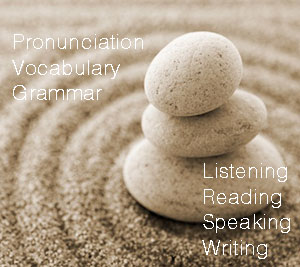It finally happened! An HR specialist of an international company short-listed your CV and invited you to an interview for your dream job. The only challenge is that they will interview you in English to make sure that your verbal skills correspond to the “Upper-intermediate level” you indicated in your CV. Stressful as a job interview is, the pressure may double if English is not your mother tongue.
Having interviewed potential candidates for their English skills at my previous jobs and having coached my Business English students with specific “interview” request, I could offer some tips to those who are eager to succeed in a job interview.
How can you use your time most efficiently to get ready?
1. Do research
“Knowledge is power“, said a famous philosopher Francis Bacon. For a while, you’ll need to turn into an enterprising and resourceful detective or an intelligence agent and dig up as much information as possible about the following issues:
✓ Job responsibilities and requirements
✓ Company products/ services
✓ Company mission and core values
✓ Company structure
✓ Competitors
✓ Your interviewer
✓ Your potential boss
Sometimes you can phone your friends who have connections in the industry to get some inside information. Make sure to read closely job description, company website, press releases and newspaper articles. Visit a LinkedIn profile and a Facebook page of your interviewer to form an impression before you meet them. If possible, try to use a company’s product to familiarise yourself with it. You can jot down notes in your notepad and review them again if you come early and need to wait for your appointed time.
2. Practice before the interview
The best way to practice is to have a session with an experienced interview coach. Another possibility is to ask your English-speaking friend to rehearse interview questions with you. You can also practice in front of a mirror trying to pay attention not only to your speaking but also to your posture, gestures and mimics.
You will be surprised how many interviewees stumble over the simplest question: “Tell me about yourself”. One way to tackle this issue would be to prepare a 2-minute “elevator-pitch” about yourself and practice it. You can mention your last position, responsibilities and achievements.
3. Refresh your CV in mind
Strange as it may seem, sometimes applicants do not bother to review their CV before the interview and don’t remember exactly what they wrote there some months ago. Memory can play strange tricks and people forget dates, responsibilities, projects and achievements. In case you have your CV on hand, you’ll be able to use it to support any answers about your previous experience.
4. Think of your strengths
Even if the interviewer doesn’t ask you about your strengths, be prepared to mention them when the opportunity presents itself. You’ll need to formulate at least three abilities and support them with examples. Perhaps, you are good at multi-tasking? Maybe you are a strong negotiator? Or, can you take a risk and go beyond your current expertise successfully? Write down all the important ideas, having consulted Business English dictionary or web articles for correct phrases.
5. Consider your weaknesses
Though many interviewers no longer ask candidates about their weaknesses directly, they may disguise this question and formulate it as: “Why shouldn’t I hire you?”, “How did you handle your mistakes?”, “Tell me about the time you failed”, “What skills do you need to develop?”.
You shouldn’t look incompetent saying something like: “I often do not meet deadlines” or “I sometimes overspend company’s budget“. Also, you shouldn’t answer in general: “I am a perfectionist” or “I am a workaholic“.
It would be the best for you to come up with a definite situation that has two sides, so that you could turn your weakness to your advantage. E.g., “I noticed that I perform better if I have many tasks, than if I have only few tasks. When I had only one task to plan the budget, it took me much longer than another situation when I had multiple tasks besides budgeting“.
6. Support your expertise with examples
Some candidates make a mistake of thinking that their interviewer perfectly remembers their CV, and, as a result, they don’t talk a lot about their expertise. They forget that an interview is a good chance to demonstrate their professional skills and experience.
Write down challenging projects and vivid situations where you displayed both your knowledge and abilities, preferably for each skill in your job description. Describe in detail how you put your skills in use, giving specific examples of how your previous experience is relevant to the job you are eager to get.
7. Make a list of your achievements
Brainstorm to make a list of your accomplishments. It can be anything connected with your previous jobs, study or even sports. Interviewers often value achievers and candidates who emit positive energy and are enthusiastic about winning their job.
Use the power of personal stories when you talk about your results. You can give some details why it was difficult to achieve and what your line of thinking was while you made decisions and took different steps.
8. Practice “situations questions”
My trainees often give me a detailed feedback after their real-life interviews, and it seems that “situations” approach still remains popular with many international companies. You can google “situational interview questions” and train the trickiest ones.
Some questions can sound like “Describe a situation when you set a goal and achieved it” or “How have you handled a difficult situation with your coworker?” or “Give an example of an occasion when you used logic to solve a problem” or “How did you overcome serious obstacles for which you’re proud?”.
Don’t memorise exact answers, just outline key ideas. It might be useful to revise correct collocations in English to show your foreign language skills to your best advantage.
9. Train “difficult questions”
Every now and then, you may run into an “aggressive interview”. Its aim is to check how well you perform under pressure. An interviewer may try to intimidate you with questions like “Why should I hire you?” or “Convince me I should pay you for this job” or even with comments like “You have the weakest qualification among all the candidates”, “Your English is awful” or “Do you always dress like that?“.
Your task is to act professional and remain calm and collected. If possible, use your sense of humour. Once I read a great article about New York street performers, who improvised humorous dialogues on a street stage, in front of a crowd. To be successful, they followed a simple rule: “Agree and add“. Even if their partner suggested something absolutely crazy, they agreed, but added their own comments. That’s exactly what will help you handle such stressful situation and project an air of confidence.
For example, Inteviewer: “Your English is awful”, candidate: “Oh yes, I’m not Stephen Fry yet, but I hope to reach the level of a BBC journalist in a couple of years”.
Or, Inteviewer: “You have the weakest qualification among all the candidates“, a candidate: “Oh really? Then I must have the strongest potential or why would you bother to interview me?”
10. Control your body language
Only special training may help people to adopt successful body language strategies. Interviewers are often skilled psychologists who can interpret your tiniest gestures, mimics, breathing pattern and even tone of voice.
General advice here would be to sit up straight but open and relaxed, smile and maintain eye contact. To establish rapport, it may be useful to mirror positive gestures of your interviewer, but not too visibly. For instance, if your interviewer touched a pen on the table, you can wait some seconds and put your hand in a mirror position.
Check that you’re not fidgeting or fiddling with your hair. Do not cross your arms or legs, it is a “closed position” that breaks contact.
11. Show your motivation
Few people know that the most important task of an interviewer is to find a motivated person. Businesses don’t need someone who will leave their company in a few months.
Experience, achievements and credentials matter only as long as a person has motivation to work for that company. You can show your motivation by telling how you made career at your previous jobs, mentioning your outside interests that motivate you (learning a foreign language, dancing, mountain climbing) or displaying interest in their company.
12. Prepare your own questions
Many business coaches mention that any interview is a two-way road, which means that you may not only answer questions, but also ask them. Sometimes the questions you ask may convince the HR manager that you are right for the job better than the answers you give. However, it would be wise to wait until you are invited to ask a question rather than do it once you enter the room.
You can ask about the company’s greatest current challenge or development goals. It might be important for you to inquire about the personality of your potential future boss, the perspectives of your career or pros and cons of the position you are discussing at the interview.
In conclusion, the more you practice interviews, the more confident you will look and the better you will perform in real life. Once you’ve attended some dozens of interviews, you will feel even more experienced than most interviewers themselves!
 Русский
Русский English
English




